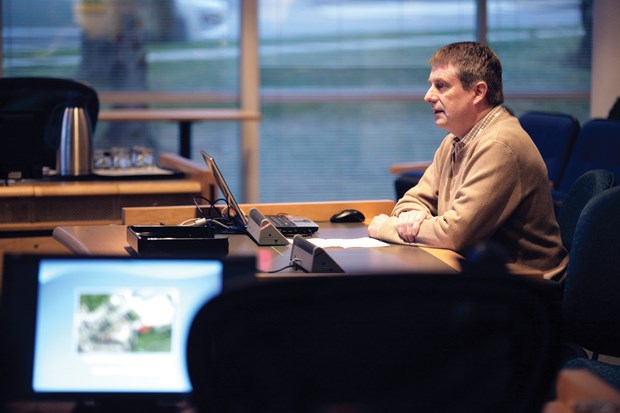It might be good and it might even be necessary, but for at least a few neighbours near Burr Place, a proposed alcohol treatment facility hits too close to home.
More than 20 speakers tried to have the last word Tuesday night on the two-storey, nine-bed recovery house for men penciled in for a tree-covered lot adjacent to Kiwanis Care Centre. The meeting, which was less crowded and more civil than the public dustups earlier this year, ended with council opting to close the hearing and vote on the facility’s future Sept. 28.
Turning Point Recovery Society opened a women’s-only treatment facility on Lloyd Avenue in August, 2014.
The society’s men’s-only centre was originally earmarked for Windridge Drive but shifted to Burr Place following an outpouring of angst from residents. However, for a few neighbours on Berkley Road and in Browning Place, the proposal took a 300-metre step in the wrong direction.
“We moved here because it’s a safe environment that we felt comfortable raising our children in,” said Liza Laine, who spoke alongside her husband and young child.
A recovery house could bring theft, robbery and violence to the family-oriented neighbourhood, according to Laine, who said she feared the actions of unstable men with drug and alcohol addictions.
“We all know the stories. They’ll do whatever it takes to get what they need,” she said.
Besides constituting a risk to children, the centre is also a threat to the pocketbook, according to Laine.
“We’re concerned from a real-estate and financial perspective that we’re going to lose money or our house will go down in value,” she said.
Her husband, Greg Laine, concurred, questioning the selection of the tree-covered lot.
“I don’t understand how a chunk of woods is ideal for this. People want to recover, they don’t want to birdwatch,” he said.
The site poses no risk to children, according to Dr. Mark Lysyshyn, Vancouver Coastal Health medical officer for the North Shore.
“I would suggest communities that don’t have these services provide a greater risk to children because fathers and uncles and brothers will not have access to these services in their community,”
Lysyshyn said when speaking about the project in March.
At Tuesday’s public hearing, Lysyshyn stressed the need for a recovery house as part of the spectrum of treatment needed to treat addiction.
“Support recovery services are needed in every community,” he said.
Speaking in opposition to the facility, Dave Iverson urged council to protect the site’s ecology and uphold the official community plan.
“Every change to the OCP means death by a thousand cuts, and it’s us, the residents of the area that are forced to deal with the dead body,” Iverson said.
The centre is very much aligned with the OCP, according to district planners Annie Mauboules and Natasha Letchford.
In a recent staff report the two planners noted the OCP’s aim of developing “supportive housing for those with mental health and/or addiction issues.”
The project is “desperately needed on the North Shore,” according to Don Peters, chairman of the Community Housing Action Committee, who lauded Turning Point’s emphasis on life skills including employment counseling.
The cost of the land for the facility is miniscule when cast against the cost of treating catastrophic illnesses related to addiction, according to Peters.
“I am deeply and personally invested in the success of the District of North Vancouver,” he said. “Helping people is what we do here.”
While there were some misgivings about Turning Point’s inability to conduct criminal background checks on patients, the majority of Tuesday’s speakers spoke in favour of the project.
“There’s a tremendous need in our community for this type of facility,” said Blueridge resident Barry Fenton. “It’s the right thing to do to provide this type of facility for men in the District of North Vancouver.”
If approved, the centre would be leased to B.C. Housing for $1 a year. B.C. Housing would provide construction capital for the Turning Point-operated facility.
In order for the land to be rezoned, the project would need a majority vote from District of North Vancouver council.
Coun. Mathew Bond did not attend the meeting.



